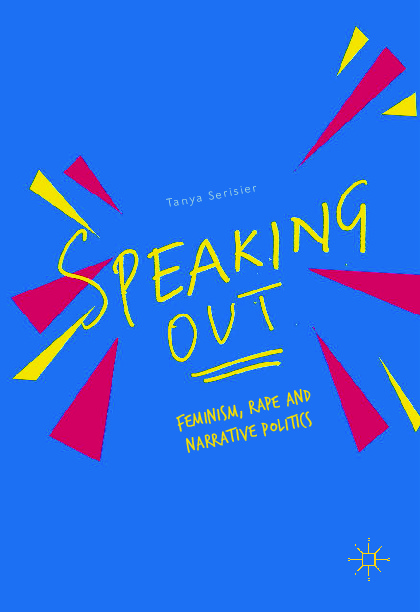File #2449: "2018_Book_SpeakingOut.pdf"
Testo
1|Acknowledgements|6
1|Contents|9
1|Part I: Speaking Out, Building a Genre|11
2|1: Introduction: The Political Promise of Personal Narratives|12
3|Approach, Scope and Organisation|22
3|A Personal Statement|28
2|2: Speaking Out Beyond Feminism: Public Survivors and Rape Narratives|31
3|Nancy Ziegenmeyer, Feminism and Criminal Justice|33
3|Jill Saward’s Conservative Anti-rape Discourse|41
3|Success and Discursive Drift|48
2|3: ‘A New Literature of Rape’: Storytelling, Genre and Subjectivity|51
3|Constructing a Genre|53
3|The Heroine’s Quest for Subjectivity|58
3|Narrative Vulnerability and the Storyteller’s Dilemma|65
3|‘Not the Only Truth’: Feminism and the Politics of Survivor Literature|71
2|4: Speaking Truth to Law’s Power: Legal Judgements and the ‘Powerful Letter’ of Emily Doe|77
3|Speaking Truth to Law|80
3|Good Witnesses and Legal Speech|87
3|Legal Grammars and Women’s Stories|96
2|5: #YesAllWomen and Heroic ‘Silence Breakers’: Online Speech, Collective Stories and the Politics of Belief|100
3|Hashtags and the Production of Collective Stories|103
3|Online Stories and Generic Judgements|110
3|Keep Telling People? Online Speech and ‘the Work’ of Combating Sexual Violence|120
1|Part II: The Politics of Speaking Out|124
2|6: Whose Business Is Speaking Out? The Bell Debate, Indigenous Stories and the Construction of White Feminist Expertise|125
3|Speaking Out, Speaking with or Speaking For?|128
3|Accounting for the ‘Special Voice’ of Feminists|137
3|Discoursing About Discourse?|146
2|7: Turning Rape into Fiction? Judgement, Genre and the Politics of Belief|151
3|How Can a Woman Who Is Raped Be Believed?|155
3|Turning Rape into Fiction|162
3|The Hijacking of Feminism by Melodrama|168
3|The Political Implications of Generic Judgement|178
2|8: That Which Must Be Broken: Silence and the Politics of Listening|182
3|Kill the Silence|185
3|The Silences of Speaking Out|189
3|Silence in Discourse and Dialogue|194
3|After Silence?|199
2|9: Conclusion: Break the Silence, End the Violence? A Politics of Narrative|202
3|Politicising Speaking Out and Electing the Predator-in-Chief|205
3|Towards a Politics of Narratives|215
1|Bibliography|221
1|Index|242
1|Contents|9
1|Part I: Speaking Out, Building a Genre|11
2|1: Introduction: The Political Promise of Personal Narratives|12
3|Approach, Scope and Organisation|22
3|A Personal Statement|28
2|2: Speaking Out Beyond Feminism: Public Survivors and Rape Narratives|31
3|Nancy Ziegenmeyer, Feminism and Criminal Justice|33
3|Jill Saward’s Conservative Anti-rape Discourse|41
3|Success and Discursive Drift|48
2|3: ‘A New Literature of Rape’: Storytelling, Genre and Subjectivity|51
3|Constructing a Genre|53
3|The Heroine’s Quest for Subjectivity|58
3|Narrative Vulnerability and the Storyteller’s Dilemma|65
3|‘Not the Only Truth’: Feminism and the Politics of Survivor Literature|71
2|4: Speaking Truth to Law’s Power: Legal Judgements and the ‘Powerful Letter’ of Emily Doe|77
3|Speaking Truth to Law|80
3|Good Witnesses and Legal Speech|87
3|Legal Grammars and Women’s Stories|96
2|5: #YesAllWomen and Heroic ‘Silence Breakers’: Online Speech, Collective Stories and the Politics of Belief|100
3|Hashtags and the Production of Collective Stories|103
3|Online Stories and Generic Judgements|110
3|Keep Telling People? Online Speech and ‘the Work’ of Combating Sexual Violence|120
1|Part II: The Politics of Speaking Out|124
2|6: Whose Business Is Speaking Out? The Bell Debate, Indigenous Stories and the Construction of White Feminist Expertise|125
3|Speaking Out, Speaking with or Speaking For?|128
3|Accounting for the ‘Special Voice’ of Feminists|137
3|Discoursing About Discourse?|146
2|7: Turning Rape into Fiction? Judgement, Genre and the Politics of Belief|151
3|How Can a Woman Who Is Raped Be Believed?|155
3|Turning Rape into Fiction|162
3|The Hijacking of Feminism by Melodrama|168
3|The Political Implications of Generic Judgement|178
2|8: That Which Must Be Broken: Silence and the Politics of Listening|182
3|Kill the Silence|185
3|The Silences of Speaking Out|189
3|Silence in Discourse and Dialogue|194
3|After Silence?|199
2|9: Conclusion: Break the Silence, End the Violence? A Politics of Narrative|202
3|Politicising Speaking Out and Electing the Predator-in-Chief|205
3|Towards a Politics of Narratives|215
1|Bibliography|221
1|Index|242

